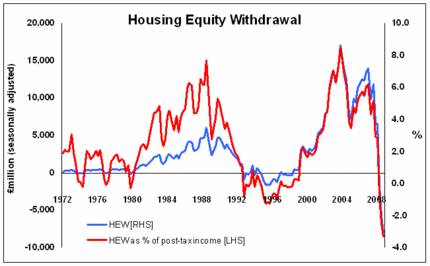Homeowners turn their backs on using their homes as a bank
I was intrigued by the response from the surveyors’ body RICS to the latest Bank of England figures for Housing Equity Withdrawal.
The figures show a continuation in the rapid repayment of housing debt, as the graph below shows, and this will have had a major impact on the recent decline in the economy.
Here are some very crude numbers to help put the scale of the shift in HEW into perspective. In the four quarters before the credit crunch bit the average quarterly level of HEW was £12.3 billion. That is roughly equivalent to about 3.5% of GDP pumped into the economy.
In the final quarter of 2008 HEW was negative to the tune of £8 billion, which equates to about 2.2% of GDP absorbed in burning off debt.

This is a major change with profound impact on the overall economy. And the figures give a feel for the brutality of a rapid change from spending to debt repayment, as people fear for the future.
So it is of little surprise that Simon Rubinsohn, chief economist at RICS should say: “Data released this morning by the Bank of England demonstrates just how damaging the collapse in the housing market has been for the wider economy.”
But he adds: “The likelihood is that despite tentative signs of a stabilising in activity in the residential market, homeowners will find it difficult to resume extracting equity from property for the foreseeable future given the weak pricing environment. This will provide a further obstacle to a recovery in the economy.”
This comment does however rather beg the question of whether it is a good idea to continue extracting equity from property, certainly on a scale anywhere near that which prevailed before the credit crunch.
There are certainly plenty who would argue that it was the profligate use of residential-backed debt that was in part responsible for the mess we are in.